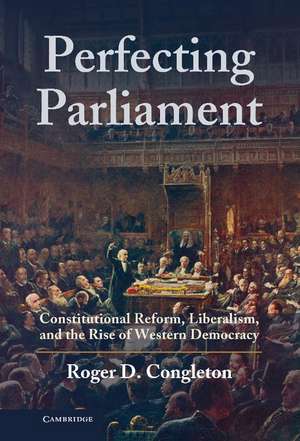Perfecting Parliament: Constitutional Reform, Liberalism, and the Rise of Western Democracy
Autor Roger D. Congletonen Limba Engleză Hardback – 7 noi 2010
Preț: 634.74 lei
Preț vechi: 713.18 lei
-11% Nou
Puncte Express: 952
Preț estimativ în valută:
121.47€ • 126.35$ • 100.28£
121.47€ • 126.35$ • 100.28£
Carte tipărită la comandă
Livrare economică 14-28 aprilie
Preluare comenzi: 021 569.72.76
Specificații
ISBN-13: 9780521764605
ISBN-10: 0521764602
Pagini: 670
Ilustrații: 16 b/w illus. 14 tables
Dimensiuni: 152 x 229 x 41 mm
Greutate: 1.02 kg
Editura: Cambridge University Press
Colecția Cambridge University Press
Locul publicării:New York, United States
ISBN-10: 0521764602
Pagini: 670
Ilustrații: 16 b/w illus. 14 tables
Dimensiuni: 152 x 229 x 41 mm
Greutate: 1.02 kg
Editura: Cambridge University Press
Colecția Cambridge University Press
Locul publicării:New York, United States
Cuprins
1. On the origins of Western democracy; 2. Team production, organization, and governance; 3. Organizational governance in the long run; 4. The origins of territorial governance; 5. Constitutional exchange and divided governance; 6. The power of the purse and constitutional reform; 7. Suffrage without democracy; 8. Ideology, interest groups, and adult suffrage; 9. Setting the stage: philosophical, economic and political developments prior to the nineteenth century; 10. Liberalism and reform in the transformative century; 11. Fine-grained constitutional bargaining; 12. An overview of British constitutional history: the English king and the medieval parliament; 13. Constitutional exchange in England: from the Glorious Revolution to universal suffrage; 14. The Swedish transition to democracy; 15. Constitutional reform in the Netherlands: from republic to kingdom, to parliamentary democracy; 16. Germany: constitutional exchange in an emerging state during the nineteenth century; 17. The Japanese transition to democracy and back; 18. The United States, an exception or further illustration?; 19. Quantitative evidence of gradual reform; 20. Ideas, interests, and constitutional reform; Appendix: methodological approach, limits, and extensions.
Recenzii
'If we know how we got here, we know more about how to proceed. This book is a comprehensive effort to help us understand the evolution of the political institutions of Western democracies. The analysis is generalized across several countries with separate but comparable histories. Emphasis is on peaceful processes of institutional development as opposed to romanticized revolutionary change. An exemplary exercise in explanatory social science.' James M. Buchanan, Nobel Laureate in Economics, 1986, George Mason University
'It is rare to find an economist who is a serious student of political history. Roger Congleton's new book is a powerful contribution to historical institutionalism.' Iain McLean, FBA, Oxford University
'Roger Congleton has written a masterful account of the evolution of parliamentary democracy in the West. The book is filled with insightful discussions of the transition to democracy in different countries. It should be of interest for all students of democracy.' Dennis C. Mueller, University of Vienna, Austria
'Roger Congleton has spent years perfecting his knowledge of democratic governance - an extraordinary effort of great value for scholars, students, politicians, and citizens.' Elinor Ostrom, Nobel Laureate in Economics, 2009, Indiana University
'It is rare to find an economist who is a serious student of political history. Roger Congleton's new book is a powerful contribution to historical institutionalism.' Iain McLean, FBA, Oxford University
'Roger Congleton has written a masterful account of the evolution of parliamentary democracy in the West. The book is filled with insightful discussions of the transition to democracy in different countries. It should be of interest for all students of democracy.' Dennis C. Mueller, University of Vienna, Austria
'Roger Congleton has spent years perfecting his knowledge of democratic governance - an extraordinary effort of great value for scholars, students, politicians, and citizens.' Elinor Ostrom, Nobel Laureate in Economics, 2009, Indiana University
Notă biografică
Descriere
This book explains why contemporary liberal democracies are based on historical templates rather than revolutionary reforms.
